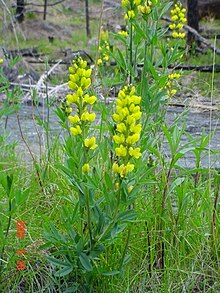Thermopsis montana
| Thermopsis montana | |
|---|---|

| |
| Scientific classification | |
| Kingdom: | Plantae |
| Clade: | Tracheophytes |
| Clade: | Angiosperms |
| Clade: | Eudicots |
| Clade: | Rosids |
| Order: | Fabales |
| Family: | Fabaceae |
| Subfamily: | Faboideae |
| Genus: | Thermopsis |
| Species: | T. montana |
| Binomial name | |
| Thermopsis montana | |
| Varieties[2] | |
| |
| Synonyms[2] | |
List
| |
Thermopsis montana, the false lupin,[3] mountain goldenbanner,[4] golden pea,[5] mountain thermopsis,[6] or revonpapu, is a plant species which is native to the western United States. The Latin specific epithet montana refers to mountains or coming from mountains.[7]
Description
Thermopsis montana is a perennial herb.[8] The flowers are golden-yellow, growing in dense but elongate racemes on leafy stems which can grow up to about 3 feet (0.91 m) in height. Flowers bloom May to August.[8] The leaves grow in triplicate formations.[9]
The plant grows densely in meadows and in moist areas of the high plains, sometimes in association with sagebrush.[9]
Cultivation
It is used as a medicinal plant,[10] and as an ornamental plant in gardens. It is suspected of being poisonous.[5] It is avoided by livestock.[11]
References
- ^ NatureServe (2024). "Thermopsis montana". Arlington, Virginia. Retrieved 27 August 2024.
- ^ a b "Thermopsis montana Nutt". Plants of the World Online. Royal Botanic Gardens, Kew. Retrieved 27 August 2024.
- ^ BSBI List 2007 (xls). Botanical Society of Britain and Ireland. Archived from the original (xls) on 2015-06-26. Retrieved 2014-10-17.
- ^ NRCS. "Thermopsis montana". PLANTS Database. United States Department of Agriculture (USDA). Retrieved 9 December 2015.
- ^ a b Whitney, Stephen (1985). Western Forests (The Audubon Society Nature Guides). New York: Knopf. p. 558. ISBN 0-394-73127-1.
- ^ "Plant Name". extension.usu.edu. Archived from the original on 2023-01-31. Retrieved 2023-01-31.
- ^ Archibald William Smith A Gardener's Handbook of Plant Names: Their Meanings and Origins, p. 239, at Google Books
- ^ a b "Lady Bird Johnson Wildflower Center - The University of Texas at Austin". www.wildflower.org. Retrieved 2023-01-31.
- ^ a b Taylor, Ronald J. (1994) [1992]. Sagebrush Country: A Wildflower Sanctuary (rev. ed.). Missoula, MT: Mountain Press Pub. Co. p. 108. ISBN 0-87842-280-3. OCLC 25708726.
- ^ Thermopsis montana in the Native American Ethnobotany database.
- ^ Fagan, Damian (2019). Wildflowers of Oregon: A Field Guide to Over 400 Wildflowers, Trees, and Shrubs of the Coast, Cascades, and High Desert. Guilford, CT: FalconGuides. p. 126. ISBN 978-1-4930-3633-2. OCLC 1073035766.
Further reading
- Pink, A. (2004). Gardening for the Million. Project Gutenberg Literary Archive Foundation.
External links
- Oregonstate.edu: Thermopsis montana Archived 2010-09-13 at the Wayback Machine

